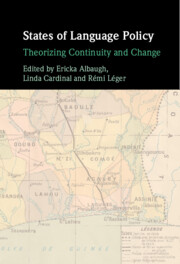Book contents
- States of Language Policy
- States of Language Policy
- Copyright page
- Contents
- Figures
- Tables
- Contributors
- Acknowledgments
- Introduction
- Part I Routes of Change
- Part II Dependent Relationships
- Part III Levels of Governance
- 11 Indigenous Reconciliation and the Limits of Canada’s Language Regime
- 12 State Tradition and Language Revitalization in Wales
- 13 Language Regime Change and Europeanization
- 14 Language Regimes, Global English, and National Public Education
- Conclusion
- Index
- References
12 - State Tradition and Language Revitalization in Wales
from Part III - Levels of Governance
Published online by Cambridge University Press: 14 November 2024
- States of Language Policy
- States of Language Policy
- Copyright page
- Contents
- Figures
- Tables
- Contributors
- Acknowledgments
- Introduction
- Part I Routes of Change
- Part II Dependent Relationships
- Part III Levels of Governance
- 11 Indigenous Reconciliation and the Limits of Canada’s Language Regime
- 12 State Tradition and Language Revitalization in Wales
- 13 Language Regime Change and Europeanization
- 14 Language Regimes, Global English, and National Public Education
- Conclusion
- Index
- References
Summary
This chapter focuses on changes in language policy in Wales between the 1960s and the present. The discussion illustrates how drawing on the concept of state tradition can help to explain why it has been possible for a general policy trajectory that has been increasingly supportive of the Welsh language to emerge during this period. However, the chapter argues that the concept of state tradition seems somewhat constrained in explaining more specific and detailed episodes in the development of language policy in Wales over recent decades. In particular, it is less able to explain why specific policies were adopted at particular junctures. Building on this, the chapter contributes to the volume by demonstrating how the insights of the state traditions and language regimes framework could be deepened if supplemented with a more explicit focus on how institutional factors across multiple levels of government can shape language policy choices, particularly in relation to regional or minority languages such as Welsh.
- Type
- Chapter
- Information
- States of Language PolicyTheorizing Continuity and Change, pp. 225 - 245Publisher: Cambridge University PressPrint publication year: 2024

